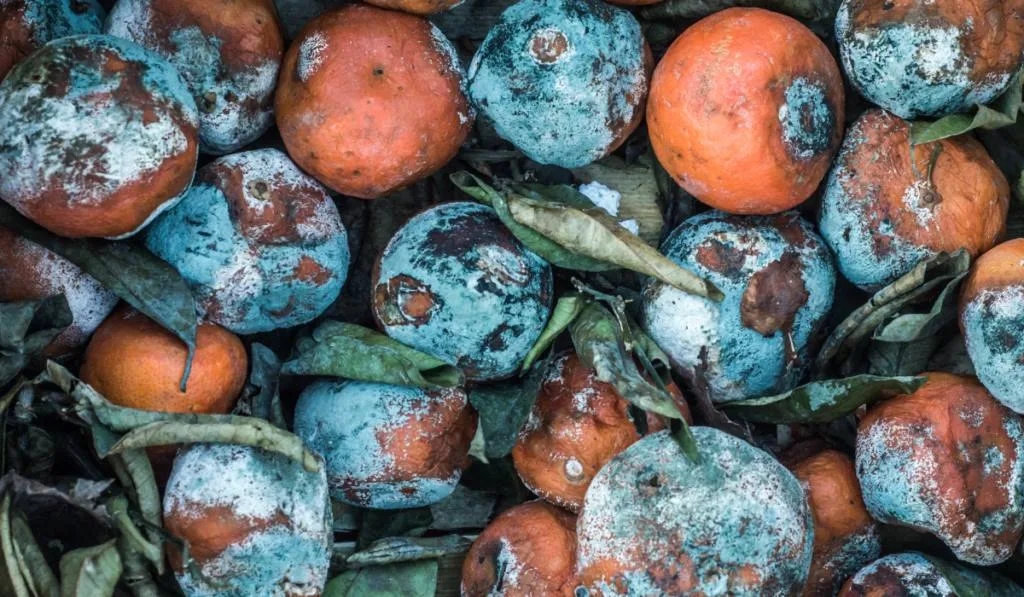Oranges are citrus fruits that are rich in vitamin C and antioxidants. Aside from their taste, people enjoy oranges due to their versatility and multi-purpose nature.
You can eat an orange raw, use it in diverse recipes, or blend it into tasty beverages and desserts. They also come in different sizes, shapes, and colors. Some oranges taste sweeter while others can have a mix of both sweet and sour.

Despite all of their benefits, oranges are perishable and can turn bad over time. But how do we spot it?
What are the telltale signs that an orange is already bad?
As with any fruit, the easiest way to recognize whether an orange is spoiled is to look at its skin. Visual cues are always the best method to spot bad oranges. If you notice any discoloration or changes in skin color, then you can be sure that the orange is bad.
There are a few other ways to tell good oranges from bad ones. Let’s dive in deeper and look at each of them.

Table of Contents
How Do You Know if Oranges Are Still Good?
By examining the skin of oranges, it will be easier for you to recognize and pick the best oranges when shopping for groceries. However, appearances can be deceiving, and you can’t rely on your eyes alone to spot bad oranges.
Another way to know whether oranges are still good is to smell them.
Fresh oranges will have a citrus odor compared to bad oranges that produce a sour-like or pungent smell.
This unpleasant odor usually comes with a rotten taste, if you decide to take a small bite just to confirm if it’s truly spoiled.
Aside from the smell, bad oranges will also have an overly soft or squishy texture that indicates that their contents have already spoiled.
Even with just a slight squeeze, their juices will ooze easier than the fresh ones. This is because fresh or good oranges would have a firm texture even when you hold or grip them tightly.
And finally, if the oranges are bad, you will notice bluish-green or white spots forming on their skin. This signifies that mold has been growing in or around the fruits. Hence, there is no reason for you to keep them.

Can a Bad Orange Make You Sick?
Similar to other foods, eating bad oranges is never a good idea.
You can get sick from bacteria, viruses, or mold that is growing inside or around the fruits. Consuming bad or rotten oranges can expose your body, especially your digestive system, to food poisoning symptoms such as cramps, vomiting, nausea, dizziness, headaches, and even fever.
If you accidentally eat a bad orange and notice any of these symptoms, quickly head to the clinic or consult your general practitioner for further diagnosis.
What Do Rotten Oranges Look Like?
Rotten oranges won’t look as good and fresh as fresh oranges. Therefore, this will make it easier for you to choose and discard the bad ones when shopping for these fruits. Rotten oranges will look much duller than fresh oranges.
Discoloration is always a great indicator that shows that these fruits are no longer safe for consumption.
You can also notice that rotten oranges will have white spots or patches on their skin, which is a sign of mold growth.
Last but not least, rotten oranges will feel a lot squishier and excessively soft compared to fresh oranges.

How Long Does It Take for Oranges to Go Bad?
Unlike most packaged or processed products, oranges don’t come with expiry date stickers on their skin. However, there is an unspoken shelf life of these fruits that you can follow to avoid keeping oranges until they turn bad.
For instance, fresh or whole oranges can be kept in the pantry for around 2 to 3 weeks tops, provided that the pantry is clean and dry. After this period, it is wise for you to check for any signs of spoilage or mold growth before consuming.
As for sliced oranges, you should instantly eat them to savor their fresh taste. But if you intend to keep them, you shouldn’t leave it in the pantry for more than a day. Sliced oranges are more prone to outside exposure that could contaminate their flesh.
But if you keep fresh or whole oranges in the fridge, they can last longer, which is around 1 to 2 months. The same thing goes for sliced oranges. They tend to last 1 to 2 days tops in the fridge.

What Is the Best Way to Store Oranges?
Oranges should be properly stored in the right place or environment to avoid conditions that could shorten their shelf life. You can either keep them in the pantry or the fridge. However, there are a few things that you should know before keeping them in either of these two different places.
Oranges that are kept in the pantry will experience drastic temperature fluctuations compared to the ones that are kept in the fridge. At room temperature, they are exposed to more outside elements, the fall and rise of humidity, as well as other contaminants.
When keeping oranges in the pantry, you should always place them in an airtight container to prevent moisture and exposure to outside air. Be sure that the pantry is clean and dry and avoid placing other smelly food near the container.
But the best place to store oranges is in the fridge.
Clean your fridge before keeping oranges inside of it. Peeled or sliced oranges should always be kept in a sealed or airtight container. This would prevent their flesh from deteriorating or becoming bad over a shorter period.
Sliced oranges can dry quickly if they’re exposed to outside air, especially every time you open and close the fridge.
You can also freeze oranges to extend their shelf life. This method is only suitable for cut or sliced oranges. Frozen oranges will taste slightly different with a firmer texture.
However, the juices in their content won’t dry or ooze compared to sliced oranges that are kept in the fridge or the pantry.

How Long Do Orange Slices Last?
Sliced oranges won’t last as long as unpeeled or whole oranges.
All things being equal, orange slices can last for a day in the pantry or on the counter, and around 1 to 2 days in the fridge.
However, their shelf life can be extended by keeping them in the freezer.
Keeping sliced oranges for too long is not a good idea. You should always eat them quickly and check for any signs of spoilage when consuming sliced oranges that are kept for more than a day.
Final Thoughts
Oranges are one of the go-to fruits that you can include in your daily diet. To get the most nutrients out of these fruits while extending their shelf life, always make sure that they are kept in the right environment.
If you’re planning to store and buy oranges in bulk, always check for their condition occasionally to avoid keeping spoiled or rotten fruits that could contaminate and destroy the whole batch.
Resources
- https://cullyskitchen.com/how-to-tell-if-an-orange-is-bad/
- http://www.eatbydate.com/fruits/fresh/how-long-do-oranges-last-shelf-life-expiration-date/
- https://saralovecooking.com/how-to-tell-if-an-orange-is-bad/
- https://www.doesitgobad.com/do-oranges-go-bad/
- https://homecookbasics.com/how-to-tell-if-an-orange-is-bad/
- https://tastylicious.com/how-to-tell-if-an-orange-is-bad/
